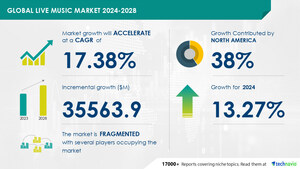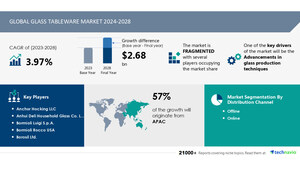NEW YORK, Oct. 17, 2024 /PRNewswire/ -- Report with the AI impact on market trends - The Global Direct-to-Consumer Genetic Testing Market size is estimated to grow by USD 1.22 billion from 2024-2028, according to Technavio.The market is estimated to grow at a CAGR of 12.99% during the forecast period. Growing adoption of direct-to-consumer genetic testing in early disease diagnosis is driving market growth, with a trend towards advances in next-generation genetic sequencing. However, doubts over analytical and clinical validity poses a challenge - Key market players include 23andMe Holding Co., 24GENETICS S.L., Alpha Biolaboratories Ltd., Ancestry, Centrillion Technology Inc., Color Health Inc., Dante Labs Inc., DNA Diagnostic Center Inc., Full Genomes Corp., Helix OpCo LLC, IntelliGenetics, Invitae Corp., Konica Minolta Inc., Laboratory Corp. Of America Holdings, MyHeritage Ltd., Myriad Genetics Inc., Positive Biosciences, Quest Diagnostics Inc., Sonora Quest Laboratories, Victorian Clinical Genetics Services, and Xcode Life.
AI-Powered Market Evolution Insights. Our comprehensive market report ready with the latest trends, growth opportunities, and strategic analysis- View your snapshot now
Forecast period |
2024-2028 |
Base Year |
2023 |
Historic Data |
2018 - 2022 |
Segment Covered |
Service (Diagnostic screening, Prenatal newborn screening & PGD, Relationship testing, and Others) and Geography (North America, Europe, Asia, and Rest of World (ROW)) |
Region Covered |
North America, Europe, Asia, and Rest of World (ROW) |
Key companies profiled |
23andMe Holding Co., 24GENETICS S.L., Alpha Biolaboratories Ltd., Ancestry, Centrillion Technology Inc., Color Health Inc., Dante Labs Inc., DNA Diagnostic Center Inc., Full Genomes Corp., Helix OpCo LLC, IntelliGenetics, Invitae Corp., Konica Minolta Inc., Laboratory Corp. Of America Holdings, MyHeritage Ltd., Myriad Genetics Inc., Positive Biosciences, Quest Diagnostics Inc., Sonora Quest Laboratories, Victorian Clinical Genetics Services, and Xcode Life |
Key Market Trends Fueling Growth
The direct-to-consumer genetic testing market is experiencing notable growth due to advancements in next-generation genetic testing technologies. Next-generation sequencing (NGS) technology, in particular, has revolutionized the industry by enabling large-scale sequencing of the human genome. This technology identifies genetic variants linked to diseases, such as cancer, cardiovascular diseases, and diabetes, which account for a significant portion of healthcare expenses. Major market players, including 23andMe, Myriad Genetics, and Quest Diagnostics, are capitalizing on these discoveries by offering a diverse range of prediction tests for various conditions. The adoption of DNA biochips is another significant trend in the market. Biochips facilitate the identification of genes and accelerate gene decoding-based biological reactions, reducing testing costs and turnaround time. These factors are driving the growth of the global direct-to-consumer genetic testing market, making it an essential component of personalized healthcare solutions.
The Direct-To-Consumer Genetic Testing market is experiencing significant growth, driven by trends in genealogy screening, pharmacogenetics, and personalized healthcare. Next-generation sequencing and innovative software enable personalized medicine and disease management. Genetic markers from saliva samples are used for ancestry testing and predictive testing for health traits and genetic conditions. Digital media advertising and awareness campaigns increase public awareness, driving retail sales. Healthcare integration and regulatory framework address privacy concerns, ensuring genetic data security. Whole genome sequencing, microarray genetic analysis, and targeted analysis provide valuable genetic insights. However, genetic testing comes with challenges such as genetic disorders, polygenic diseases, and environmental factors. OTC platforms, precision medicine, and genetic screening services are transforming the industry, offering home DNA testing and forensic laboratories. Despite these advancements, genetic testing drawbacks, including health risks and genetic privacy, must be addressed.
Insights on how AI is driving innovation, efficiency, and market growth- Request Sample!
Market Challenges
- Direct-to-consumer genetic testing market growth faces challenges due to concerns over test validity and accuracy. The scientific evidence supporting these tests is limited, leading to questions about their clinical validity. Disease risk predictions exclude crucial environmental and lifestyle factors, necessitating consultation with medical professionals for reliable interpretation. False positives and negatives can cause distress and additional costs. Regulatory scrutiny and FDA warnings have restricted market expansion, making disclosure of authorized tests and instructions mandatory. These factors hinder the growth of the direct-to-consumer genetic testing market.
- The Direct-To-Consumer Genetic Testing market is experiencing significant growth due to increasing public awareness and accessibility. However, challenges persist. Genetic variations and disease management require advanced technologies like genome sequencing and microarray genetic analysis. Forensic laboratories and retail sales face regulatory hurdles. Genetic privacy is a major concern, with potential health risks from genetic disorders and environmental factors. Genetic screening services using saliva samples or cheek swabs offer convenience, but genetic testing drawbacks include limited accuracy and potential misinterpretation. Diseases like cystic fibrosis, sickle cell disease, Alzheimer's disease, cancers, and rare chronic illnesses can be identified, but presymptomatic testing raises ethical questions. Customized healthcare solutions via online platforms and next-generation technologies like genome analysis, machine learning, and artificial intelligence are promising. OTC products and at-home kits using SNP microarray analysis are gaining popularity. Overall, the market offers opportunities for innovation, but requires careful consideration of ethical, regulatory, and privacy issues.
Insights into how AI is reshaping industries and driving growth- Download a Sample Report
Segment Overview
This direct-to-consumer genetic testing market report extensively covers market segmentation by
- Service
- 1.1 Diagnostic screening
- 1.2 Prenatal newborn screening & PGD
- 1.3 Relationship testing
- 1.4 Others
- Geography
- 2.1 North America
- 2.2 Europe
- 2.3 Asia
- 2.4 Rest of World (ROW)
1.1 Diagnostic screening- Direct-to-consumer genetic testing provides individuals with critical information about their risk of inheriting diseases, including cancer, neurological disorders, diabetes, cardiovascular diseases, and rare diseases. Vendors offer various tests, such as cancer predisposition tests, genetic health risk tests, and carrier screening tests. Notable examples include Myriad's myRisk Hereditary Cancer test, Invitae's Multi-Cancer Panel, Color Genomics' BRCA1 and BRCA2 tests, and Xcode Life's Gene Health. The increasing demand for early disease diagnosis drives revenue growth in the diagnostic screening segment, fueling market expansion.
Download complimentary Sample Report to gain insights into AI's impact on market dynamics, emerging trends, and future opportunities- including forecast (2024-2028) and historic data (2018 - 2022)
Research Analysis
The Direct-To-Consumer Genetic Testing market is a rapidly growing industry that offers individuals the opportunity to access their genetic information for various applications. This market encompasses a range of tests, including genealogy screening, pharmacogenetics, and ancestry testing, which utilize DNA samples to provide insights into health traits, genetic variations, and ancestry. Next-generation sequencing technologies and digital media advertising are driving awareness and accessibility, leading to increased public interest. Customized healthcare solutions, personalized medicine, and disease management are key areas of focus, with applications in presymptomatic testing for conditions like sickle cell disease, Alzheimer's disease, and cancers. Online platforms and next-generation technologies facilitate genome analysis, enabling machine learning and artificial intelligence to provide valuable insights. Forensic laboratories also utilize genetic testing for identification purposes. Overall, this market offers a wealth of opportunities for personalized healthcare and disease management.
Market Research Overview
The Direct-To-Consumer Genetic Testing market is a rapidly growing industry that offers individuals the opportunity to access genetic information about their ancestry, health traits, and potential diseases. This market includes various types of tests such as genealogy screening, pharmacogenetics, and ancestry testing, among others. Next-generation sequencing technologies, innovative software, and online platforms enable the analysis of genetic markers, including SNPs and microarray analysis, to identify health risks and genetic conditions. Pharmacogenetics and personalized medicine are key areas of focus, allowing for customized healthcare solutions based on an individual's genetic makeup. Whole genome sequencing and targeted analysis provide comprehensive insights into an individual's genetic information, including polygenic diseases and rare chronic illnesses. Digital media advertising and awareness campaigns are essential for reaching potential customers, while healthcare integration and regulatory frameworks ensure the accuracy and privacy of genetic data. Privacy concerns are addressed through strict regulations and innovative software solutions. Tests can be conducted using saliva samples or DNA samples, and include predictive testing for diseases such as cystic fibrosis, sickle cell disease, Alzheimer's disease, and various cancers. The market also includes OTC platforms, retail sales, and forensic laboratories, offering a range of testing options for consumers. Environmental factors and genetic variations play a role in disease development, and genetic testing can provide valuable insights into disease management and risk reduction. Machine learning and artificial intelligence are used to analyze genetic data and provide personalized health recommendations. The market faces challenges such as genetic testing drawbacks, including potential misinterpretation of results and privacy concerns. However, the benefits of genetic testing, including early disease detection and customized healthcare solutions, continue to drive growth in this industry.
Table of Contents:
1 Executive Summary
2 Market Landscape
3 Market Sizing
4 Historic Market Size
5 Five Forces Analysis
6 Market Segmentation
- Service
- Diagnostic Screening
- Prenatal Newborn Screening & PGD
- Relationship Testing
- Others
- Geography
- North America
- Europe
- Asia
- Rest Of World (ROW)
7 Customer Landscape
8 Geographic Landscape
9 Drivers, Challenges, and Trends
10 Company Landscape
11 Company Analysis
12 Appendix
About Technavio
Technavio is a leading global technology research and advisory company. Their research and analysis focuses on emerging market trends and provides actionable insights to help businesses identify market opportunities and develop effective strategies to optimize their market positions.
With over 500 specialized analysts, Technavio's report library consists of more than 17,000 reports and counting, covering 800 technologies, spanning across 50 countries. Their client base consists of enterprises of all sizes, including more than 100 Fortune 500 companies. This growing client base relies on Technavio's comprehensive coverage, extensive research, and actionable market insights to identify opportunities in existing and potential markets and assess their competitive positions within changing market scenarios.
Contacts
Technavio Research
Jesse Maida
Media & Marketing Executive
US: +1 844 364 1100
UK: +44 203 893 3200
Email: [email protected]
Website: www.technavio.com/
SOURCE Technavio

WANT YOUR COMPANY'S NEWS FEATURED ON PRNEWSWIRE.COM?
Newsrooms &
Influencers
Digital Media
Outlets
Journalists
Opted In





Share this article